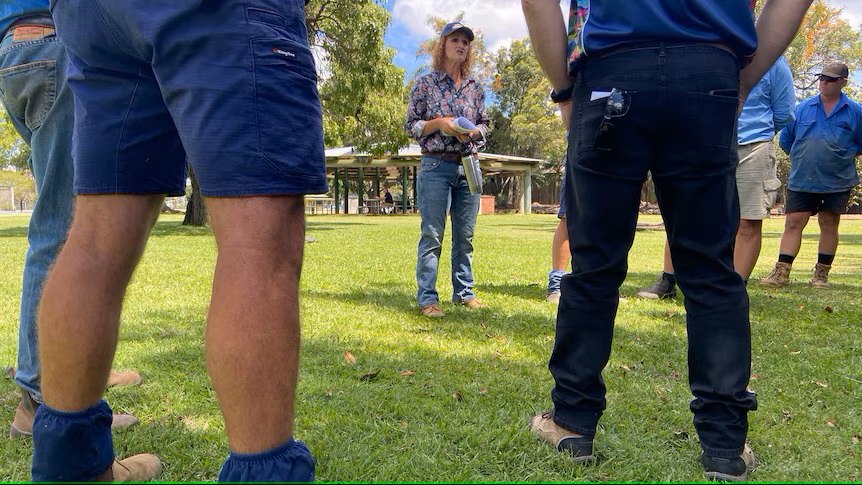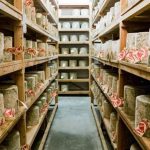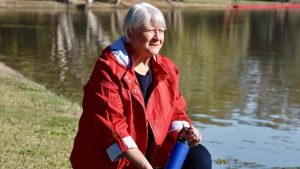
In short:
Irrigators in the Bundaberg region are urging the next state government to reject the federal government’s proposed new National Water Agreement (NWA).
The NWA will overhaul Australia’s overarching water policy, which is 20 years old and considered unfit to meet the challenges posed by climate change.
What’s next?
The Qld Labor government says irrigators’ existing entitlements will not be impacted. The Opposition LNP says it will not sign an agreement that hurts farmers.
In a region that grows a quarter of the nation’s fruit and vegetables, farmers are worried a new national water policy will grind future investment to a halt and put water security at risk.
On the eve of the Queensland election, irrigators in the Bundaberg region, 400 kilometres north of Brisbane, are urging the next state government to reject the federal government’s proposed new National Water Agreement (NWA).
They fear whoever wins power on October 26 will be under pressure to approve the draft plan by the end of the year, based on Department of Climate Change, Energy, the Environment and Water (DCCEEW) timelines.
Bundaberg Irrigators meet to discuss the draft National Water Agreement. (ABC Wide Bay: Nikki Sorbello)
Old plan leaves First Nations out
The NWA will overhaul Australia’s overarching water policy, the National Water Initiative (NWI), which is 20 years old and considered unfit to meet the challenges posed by climate change.
A 2021 review of the existing NWI also found it left Aboriginal and Torres Strait Island peoples out of the national conversation on water and was not aligned with Closing The Gap targets.
The new proposal seeks to incorporate better science and boost participation by First Nations peoples in water management.
But Bundaberg irrigator Judy Plath said it overlooked the importance of agriculture and irrigators as a key stakeholder.
“Agriculture is a huge water user in Australia and Queensland, yet we have not been recognised in this national water document in its current form,” Ms Plath said.
“At the end of the day, irrigators and farmers are the ones using water right now and we need to have confidence that our water rights are secure and will remain secure under this new water agreement.”
For farmers in this food bowl region of Queensland, it is another blow to water security as they deal with years of uncertainty about their primary water storage, Paradise Dam.
The 300,000 megalitre dam was lowered almost 6 metres in 2019 due to safety concerns and found to be irreparable earlier this year.
Farmer Michael McMahon said he was “distraught” that water security could be further compromised.
“It’s hard to believe that we have to be here fighting every inch, every day,” he said.
Michael McMahon says it’s hard to believe farmers are still fighting for water security. (ABC Wide Bay: Johanna Maree)
Implications of proposed policy ‘unknown’
Under the existing NWI, state and federal policies set caps on how much water could be extracted from river and groundwater sources, and how water should be shared between households, industry and the environment.
This month, the federal government’s independent research and advisory body, the Productivity Commission, provided feedback on the draft new agreement.
It recommended replacing the proposed 173 principles with a small set of overarching principles.
It said the purpose, role and intended longevity of the plan needed to be clarified.
Bundaberg is one of Australia’s food bowls. (ABC News: Johanna Marie)
“Up to now, material released by the Australian government for public consultation has not provided much guidance on the potential scope and conduct of performance assessment requirements in an NWA,” it said.
National Irrigators Council chief executive Zara Lowien said the implications for water management were still largely unknown.
“The last version we saw is still very high level and aspirational and moves away from the ground-up foundational document that we got in 2004, that took 10 years to develop,” she said.
“I don’t think [an incoming] government in Queensland will have time to go through and understand what this means for Queenslanders by the signing deadline.”
Queensland’s Water Minister Glenn Butcher said the agreement had not been finalised and farmers and their existing entitlements would not be impacted.
The Opposition Liberal National Party spokesperson said the LNP would not sign Queensland up to a national water agreement if it hurt farmers and drove up costs for families.
Improving First Nations participation
The 2021 review of the existing NWI policy found it failed to consider the rights and aspirations of First Nations people to manage, own and control water for their own economic and cultural purposes.
The Australian government says the proposed agreement makes no changes to irrigators’ water entitlements. (ABC Rural: Tom Major)
Indigenous Australians hold rights to approximately 40 per cent of Australian land through Native Title, yet they own and control less than 0.2 per cent of water, according to the DCCEEW.
Gunditjmara Djab Wurrung man and chief executive of the National Native Title Council, Jamie Lowe, said involving First Nations people in water policy would benefit everyone.
“From an environmental and cultural perspective, for thousands of years, we’ve had outstanding water management practices, so from that perspective, First Nations people have a lot to offer,” he said.
Michael Murray says the draft National Water Agreement is “unbalanced”. (Supplied: Cotton Australia)
Queensland Farmers Federation water and energy policy committee chair Michael Murray said the NWA could become “unbalanced” and “changes how water is managed”.
But Mr Lowe said there was a “glaring” gap within the water market and urged all representative groups to “cut beneath the rhetoric” and find out the real details of the plan.
“I encourage them to start working with First Nations communities and create a relationship with them, so it’s not such an adversarial relationship,” he said.
Jamie Lowe says claims the draft policy is unbalanced is “ironic”. (Supplied: National Native Title Council)
“It’s more a relationship where they can come to a consensus on use and how to manage the water with that particular catchment area.”
A department spokesperson said the draft NWA maintained strong water access provisions already in place.
“And makes no changes to water entitlements held by irrigators and other water users,” they said.
You can now read the most important #news on #eDairyNews #Whatsapp channels!!!
🇺🇸 eDairy News INGLÊS: https://whatsapp.com/channel/0029VaKsjzGDTkJyIN6hcP1K

























